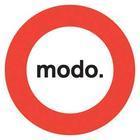News: A Genuine Car Sharing Experience

Modo The Car Co-op (formerly Co-operative Auto Network) is a local not-for-profit co-operative whose main goal is to foster carsharing as a beneficial alternative to private vehicle ownership. Modo strives to provide a genuine carsharing experience for its members, as well as to enrich the lives of their members and facilitate active green transportation solutions for a sustainable community.
By carsharing, Modo hopes to
- Improve air quality,
- Reduce stresses on green space,
- Eliminate many non-point sources of pollution and
- Encourage active planning in every out trip.
Carsharing was first officially introduced in 1994 and since then has been at the forefront of a new economy called the ‘shared economy’. Although the concept of sharing a car is not new, some still might wonder what carsharing is, how it works, can you really save money, etc. This article hopes to answer those questions and encourage readers to look at alternative modes of transportation to privately owned vehicles.
It has been estimated that most automobiles carry only one person and are used for less than 1 hour per day. In other words, most private cars typically sit in the driveway an inefficient 95% of the time. A more rational approach then would be to use the vehicles more intensively. However, the environmental and social cost resulting from such a significant increase in car usage is high.
Why not simply switch to carsharing? Predictably, private vehicle ownership is attractive because of its instant availability. When asked what exactly it was that stopped urban drivers from making the transition from private ownership to car sharing, Tanya Paz, Business Development Director for Modo, replied that the first obstacle that drivers of private vehicles face is getting rid of their cars.
The second is addressing the misconception that there will not be enough vehicles to meet fluctuating and potentially sporadic demands placed on the vehicle supply. However, although booking can be arranged for up to a year in advance, according to Modo’s reservation records almost all booking occurs within 24 hours of the booking day, and more surprisingly the majority of those are booked within 20 minutes of pick up. Modo is able to make this work because as Paz puts it, the organization is obsessed with watching the demands of their members and responding to the needs of the community. Unlike other carsharing companies, Modo carefully assesses the demand base and places only enough cars to meet the demand. As a result, there are enough cars for their members within the given locations without underutilized car issues.
How does carsharing work? Carsharing caters to both residential and business commuting needs by providing cars in residential areas and central locations throughout the city. Central locations comprised of transit stops (buses and Skytrains), universities, downtowns, airports, and rail stations. Commuters coming home from work can pick up a car from the transit station, drive it home, and then return it to the station the next morning for their trip into the city center for work. In turn, while the cars are at the station during the daytime hours, reverse commuters can use them to drive to their workplace in the suburbs and then back to the station when they return home. In both situations, the fleet of cars is used for multiple trips by different individuals throughout the day eliminating the underutilized car issue.
Carsharing is different from ride sharing or carpooling in that they are not designed to transport a group of people to a common destination at the same time. Instead, a more practical and realistic solution is to provide an alternative to private vehicle ownership that allows members easy access to a car when walking, cycling, or public transit is not possible or convenient. In other words, carsharing is flexible enough to work with individual schedules and needs. Tanya Paz emphasises that carsharing should be seen as part of the commuting spectrum that helps you get from point A to point B.
Unlike renting a car, carsharing gives individual access to a car for brief trips, charging only for the time and duration of each trip. In comparison, rental agencies charge the full daily rate, regardless of the duration or distance of travel. In addition to the full day rate, renters must pay for the gasoline required to fill the vehicle`s tank at the time it is returned, whereas carsharing organization pays all the costs of fuel as well as insurance, vehicle maintenance, services, and repairs.
Using the calculator on Modo`s website, it is possible to compare how much it costs to own and maintain a car versus the cost of carsharing. This annual cost will of course vary depending on the individual, but the estimated total annual cost of carsharing is far more beneficial to your savings account than to own a car that sits uneconomically in the driveway 95% of the time. Paz added that she has had members come up to her and tell her they were able to afford a house with the help of the money they saved from carsharing with Modo!
As part of providing their members with an alternative to private car ownership, Modo has adopted goals that work with the community to change the way we think about commuting and how we plan our daily commutes. Modo’s success and role as a leader in the carsharing industry is attributed to their strong vision and belief in sustainable growth that takes into account the triple bottom line - economic, social and environmental factors. With a goal of having fewer cars on the road, Modo is in the process of upgrading their fleet with more fuel efficient vehicles.
`We are all role models for ourselves`.
Category:


































